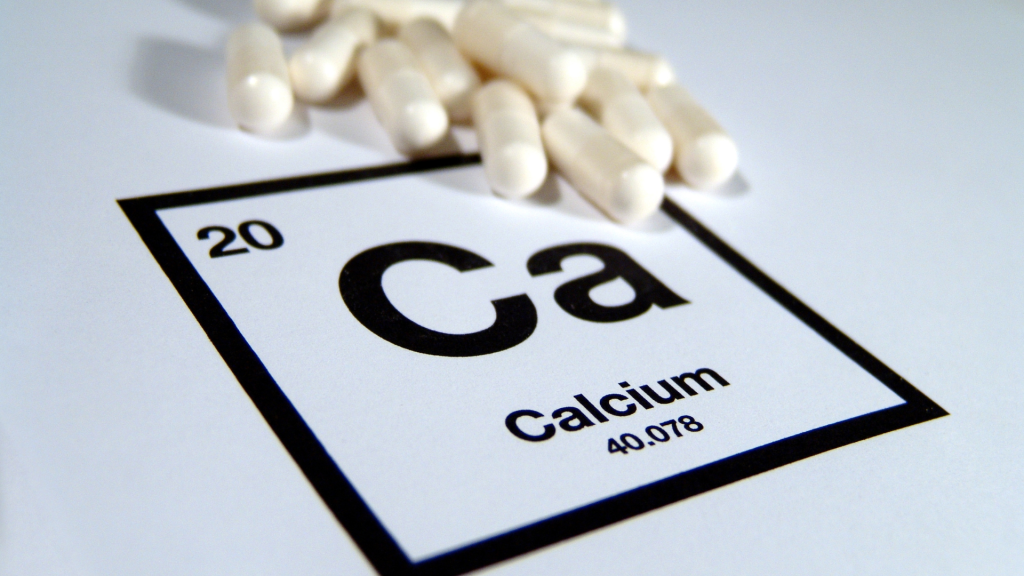As you age, shifts in hormones and metabolism slow down your bone-building process. Old bone cells die faster, and fewer new ones are made. When that balance is off, your bones can become weaker over time. The first sign is osteopenia — a mild loss in bone mass. If it continues, it may progress to osteoporosis, where bones become fragile and break easily.
The Benefits of Calcium
Calcium plays a key role in keeping your body strong and healthy. It builds and maintains strong bones and teeth. Your muscles use calcium to move, and your heart relies on it to beat steadily. Calcium also helps your nerves send signals and supports blood clotting when you get injured. Without enough calcium, your body takes it from your bones, which makes them weaker over time. That’s why getting enough calcium daily is so important, especially as you get older.
Don’t Ignore Low Calcium—Here’s Why It Matters
Your bones rely on calcium to stay strong. Without enough, your body pulls calcium from bones, weakening them over time. Kids who don’t get sufficient calcium may not reach their full height. Adults risk developing brittle bones or osteoporosis, making fractures more likely.
Despite its importance, many people—especially growing teens and adults over 50—fall short on calcium.
Daily Calcium Needs
The right amount changes with age and life stage:
For Men:
- 19–70 years: 1,000 mg
- 71+ years: 1,200 mg (bones lose density with age)
For Women:
- 19–50 years: 1,000 mg
- 51+ years: 1,200 mg (bone loss speeds up after menopause)
Upper Safety Limit:
- Under 50: No more than 2,500 mg daily
- Over 50: Keep below 2,000 mg daily
Too much calcium (usually from supplements) can cause kidney stones or interfere with heart function. Food sources are safer and better absorbed.

Simple Ways to Get Enough Calcium
- A glass of milk or fortified plant milk (~300 mg)
- A serving of yogurt (~300–400 mg)
- A handful of almonds (75 mg)
- Leafy greens like kale or bok choy (100 mg per cup)
- Canned sardines or salmon with bones (~200 mg per serving)
Your body absorbs calcium best when paired with vitamin D (from sunlight, eggs, or fatty fish). If you take supplements, split doses—your body can’t process more than 500 mg at once.
Did you know? Spinach has calcium, but its oxalates block absorption. Broccoli and kale are better plant-based picks.
Who Should Consider Calcium Supplements?
You might think you’re covered if you eat well, but certain factors can make it tough to get enough calcium:
- Vegan or dairy-free? Without milk, yogurt, or cheese, you miss major calcium sources.
- Lactose intolerant? Avoiding dairy can leave gaps in your calcium intake.
- High-protein or salty diet? Excess protein and sodium flush calcium out of your body.
- On long-term steroids? Medications like prednisone weaken bones over time.
- Digestive issues? Conditions like celiac disease or Crohn’s reduce calcium absorption.
If any of these apply, supplements might help—but they’re not a one-size-fits-all fix. Too much calcium from pills can cause kidney stones or heart problems.
What to do instead?
- Try calcium-fortified foods like almond milk, tofu, or orange juice.
- Pair calcium-rich meals with vitamin D (sunlight, eggs, salmon) for better absorption.
- If considering supplements, talk to your doctor first. They can check if you really need them and recommend the right type (calcium citrate absorbs better than carbonate for some people).
Remember: Food first, supplements second. Your body prefers nutrients from real meals.
Do Calcium Supplements have Risks?
Calcium supplements can be helpful, but they’re not right for everyone—and in some cases, they could even pose risks.

Who Should Avoid Calcium Supplements?
- People with hypercalcemia (high blood calcium levels) – Extra calcium could worsen the condition.
- Those at risk for kidney stones – Excess calcium, especially from supplements, may contribute to stone formation.
- Individuals with certain heart conditions – Some research suggests a possible link between high-dose calcium supplements and heart disease, though findings are still unclear.
- Men concerned about prostate cancer – A few older studies hinted at a connection between high calcium intake (from dairy or supplements) and increased prostate cancer risk, but newer research hasn’t confirmed this.
What Should You Do?
- Get calcium from food first – Dairy, leafy greens, fortified plant milks, and fish with bones (like sardines) are safer and better absorbed.
- If you take supplements, don’t overdo it – Stick to doses your doctor recommends, and avoid exceeding 500–600 mg at once (your body can’t absorb more than that in a single dose).
- Talk to your doctor – Especially if you have heart, kidney, or prostate health concerns, or if you’re on medications that affect calcium levels (like steroids or thyroid meds).
Types of Calcium Supplements
Not all calcium supplements are created equal. They come in different forms, each with varying amounts of elemental calcium—the type your body actually absorbs. (🔗)
Common Types & When to Use Them
- Calcium Carbonate (40%)
– Most common and affordable.
– Best for most people.
– Take with food for better absorption. - Calcium Citrate (21%)
– Easier to absorb, even with low stomach acid.
– Best for older adults or those with absorption issues.
– Can be taken with or without food. - Calcium Gluconate (9%) & Lactate (13%)
– Less concentrated, so you’ll need a larger dose.
– Best for those needing gentle options or specific conditions.
What to Keep in Mind
- Some supplements also include vitamin D or magnesium to help with absorption.
- Always check for elemental calcium on the label—it tells you how much usable calcium you’re getting.
- Lastly, if you have digestive issues or take medications, talk to your doctor before choosing a supplement.
Too Much Calcium? Yes, That Can Be a Problem
While calcium is essential, taking too much can cause trouble. High doses may lead to constipation, kidney stones, or even interfere with how your body absorbs other minerals like iron and zinc. In some cases, excess calcium from supplements may raise the risk of heart issues. That’s why it’s important to meet—but not exceed—your daily calcium needs. Stick to the recommended amounts, and always check with your doctor if you’re unsure.




